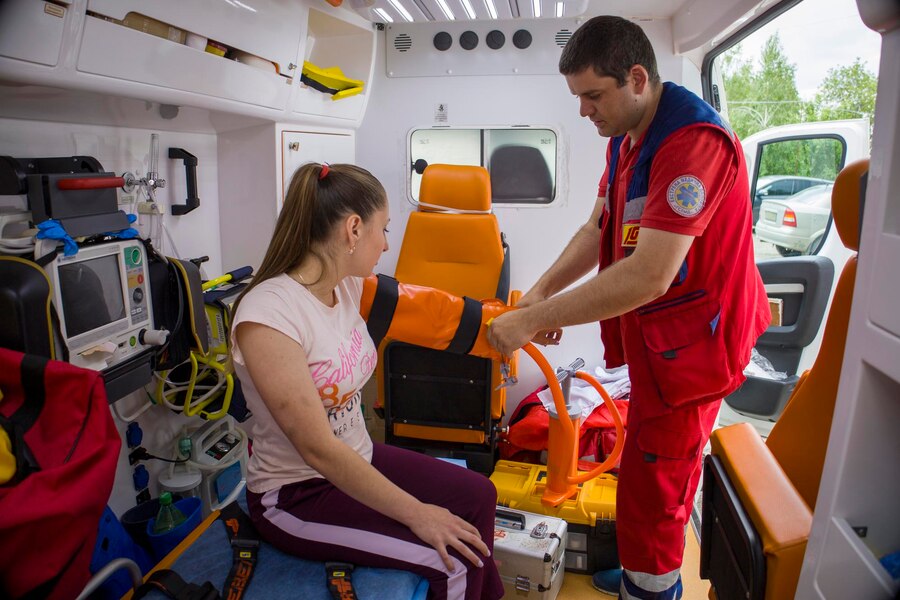When seconds matter, EMTs are the first to show up and the last to give up.
In North Carolina, Emergency Medical Technicians (EMTs) are essential for providing patient care across diverse landscapes, from the mountains to the coast. To begin this rewarding career and respond to emergencies, you must first obtain your certification.
To begin your journey as an EMT, it's required to complete a state-approved training program followed by the NREMT cognitive exam. This exam is not like standard tests you may have taken before; it requires thorough preparation and an understanding of the material beyond basic knowledge. To succeed, dedicated study and practical preparation are crucial.
Here’s a step-by-step guide to EMT certification in North Carolina and how to pass it the right way.
Step 1: Meet North Carolina's Basic Eligibility
To begin EMT training in North Carolina, you must:
- Be at least 18 years old to enroll in a course. You can still take the EMT and EMR state exams even if you’re 17. However, the North Carolina Office of EMS will hold the licensure until you turn 18.
- Have a high school diploma or GED. Alternatively, if you pass an entrance exam that assesses reading comprehension at an 11th-grade level, you can also be eligible for some programs.
- Hold a current CPR certification for healthcare providers
- Pass a criminal background check
- Some programs also require immunization, including TB, COVID-19, Flu, etc.
- You’ll also need to be physically and mentally fit for EMS work.

Step 2: Complete a State-Approved EMT Course
EMT education in North Carolina is overseen by the North Carolina Office of Emergency Medical Services (NCOEMS).
You’ll need to complete an NCOEMS-approved EMT program. These are offered at:
- Community colleges
- EMS training centers
- Technical schools
Your course will include:
- Classroom instruction
- Skills labs
- Clinical or field internships
After successful completion of the state-approved training, you become eligible for the NREMT cognitive exam—the next major hurdle.

Step 3: Pass the NREMT Cognitive Exam
This is where many students feel stuck. The NREMT cognitive exam doesn’t test memory or facts. It assesses your decision-making skills and ability to perform well under pressure.
You’ll be tested on how you respond to real-life EMS situations, not just what you memorized. The test is computer-adaptive, so it adjusts in real-time based on how you answer.
The National Registry recently updated the course domains to be in line with the current patient care needs. Here are the five updated domains as of April 2025:
- Scene Size-Up and Safety
- Primary Assessment
- Secondary Assessment
- Patient Treatment and Transport
- Operations
Note: Items related to pediatric patient care are integrated throughout all domains.
You’ll get 70–120 questions. The exam ends once the system determines a pass or fail.
Quick Tip: The best way to study for NREMT is to simulate the real thing. NREMT practice exams, clinical reasoning drills, and feedback from an experienced NREMT prep tutor can help you feel ready when it counts.

Step 4: Apply for North Carolina EMT Certification
Once you pass the NREMT exam, you’ll apply for certification through the North Carolina Office of Emergency Medical Services (NCOEMS).
To apply, you’ll need:
- Proof of course completion
- NREMT cognitive exam passing result
- CPR certification
- Background check and fingerprinting
- Completed application and fee
Once your materials are approved, you’ll receive your state EMT credential.

Step 5: Maintain Your Certification
North Carolina EMT certifications are valid for four years.
To stay certified, you must:
- Complete the required continuing education
- Maintain your CPR certification
- Keep your NREMT status active or meet state recertification guidelines
Letting your certification lapse could mean repeating the NREMT exam, so stay current.
National Certification vs. North Carolina State Credential
Here’s how state and national requirements differ from each other:
| Requirement | NREMT (National) | North Carolina State License |
|---|---|---|
| NREMT Cognitive Exam | Required | Required |
| CPR Certification | Required | Required |
| ALS psychomotor skills | Discontinued | Required |
| State-Approved EMT Course | Required | Required |
| Background Check | Not Required | Required |
| State Application | Not Applicable | Required |
You need both to work legally in the state and qualify for most EMS jobs.
Note: The National Registry has discontinued the ALS psychomotor skills test. Hence, hands-on skills test isn’t a national-level requirement as of 2024.

Why North Carolina EMTs Trust How To NREMT
At How To NREMT, we help people pass smarter, not harder.
70% of our members are first-time test takers looking to prepare the right way from the get-go. The remaining 30% are students who’ve failed the test before and want to pass on their next attempt.
They all come to us for the same reason: we focus on the actual test, not just textbook content.
What You Get with How To NREMT
- 10-Step Study Plan– A clear, structured approach to exam prep
- 2,000+ NREMT-style practice questions– Designed to mimic the NREMT’s scoring algorithm.
- Unlimited Live Group Coaching– Join Zoom sessions led by EMS educators
- How To– Our AI-powered NREMT prep tutor, available 24/7
- Full prep for Technology Enhanced Items (TEIs)– Including drag-and-drop, build-list, and multi-step decision questions
If you're looking for the best way to study for NREMT, you’re in luck because we are it!
- Choosing a selection results in a full page refresh.
